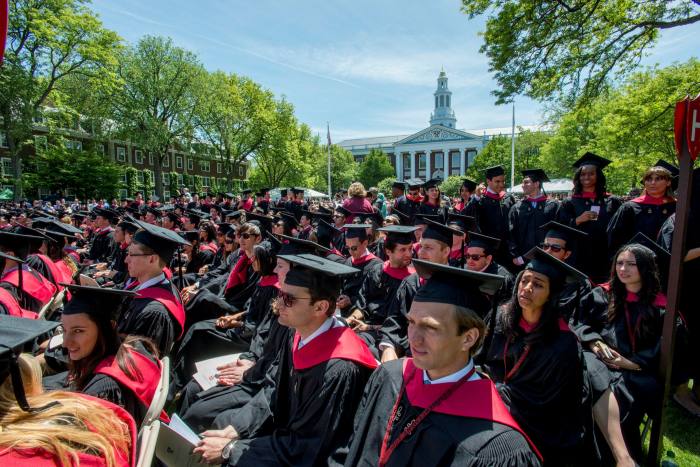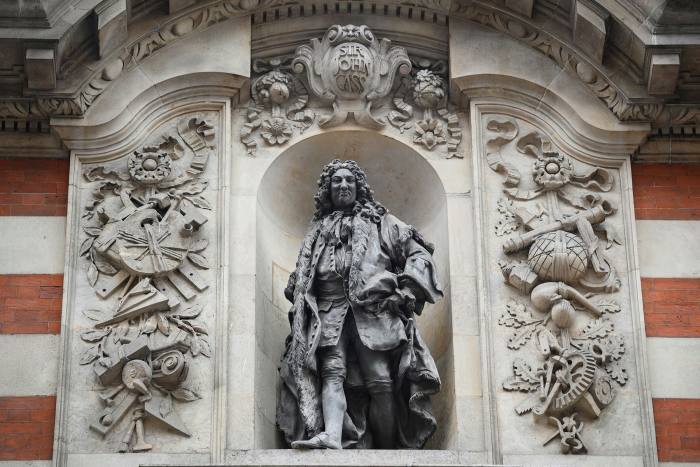The small business faculty at City, University of London, is beginning a reckoning with the previous. Past month, its governing council voted to remove Sir John Cass from the small business school’s title for the reason that of the 18th-century English merchant’s position in the Royal African Company, which then held the British monopoly on the transatlantic slave trade.
The school’s involvement with Cass only dates back 18 years, when it transformed its title right after accepting a £5m donation from Sir John Cass’s Basis, a charitable entire body the merchant produced to guidance education and learning in London.
In the US, higher education and learning establishments are acknowledging previous lively involvement with slavery. The motion began in theological seminaries — to start with at Virginia Theological Seminary, which previous September produced a $1.7m fund to make reparations for obtaining made use of enslaved people today as labour on its campus. Some others, which include Jesuit-started Georgetown University, adopted with reparation designs.
And in the wake of the current Black Lives Subject protests worldwide, the momentum for transform in higher education and learning has sped up. Within just the world-wide small business faculty sector, numerous establishments are working to turn into much more inclusive in their curriculum, choosing and scholar admissions processes.
Days prior to its title transform, Cass, now identified as City’s Company College, had hosted a 3-hour online workshop known as “Decolonising the Company School”. The event attracted much more than 400 participants from about 300 small business universities, who logged on to focus on producing their courses and admissions processes much more inclusive for all black, Asian and minority ethic pupils.
“This is a pivotal moment for race relations all over the place, and it should go much outside of title modifications,” suggests Bobby Banerjee, a management professor at City, who assisted organise the online event in his position as co-founder of the small business school’s Centre for Accountable Business.
“Black people today do not want to occur to small business faculty for the reason that they do not see black faces. We consequently have to transform choosing and marketing procedures,” Prof Banerjee suggests.
The amount of black pupils on hugely rated US MBA courses continues to be low. Harvard Company College, wherever about 9 for each cent of previous year’s total-time MBA ingestion were being black, has included two senior roles to inspire much more minority candidates. However, Nitin Nohria, Harvard Company School’s dean, wrote in an open up letter to personnel and pupils in June that tries to recruit black pupils up right up until now had been “painfully insufficient”. A great deal the same was genuine for the recruitment of black professors, he included.
Laura Morgan Roberts, professor of observe at the University of Virginia’s Darden College of Company, co-authored a research of black HBS pupils in 2018, which located important extra barriers for this group in contrast with their classmates.
“Black pupils and alumni even now confront hurdles because of to race and other socio-demographic indicators. They experience racism and classism in their lecture rooms from college and friends, in social networking, and with recruiters,” she suggests.
The PhD Venture was started in 1994 to keep track of the numbers of Bame teachers in the belief that boosting numbers below would make pupils from these backgrounds come to feel much more approved on postgraduate management diploma programmes.
In 2010, it recorded 790 African American college, or 2.seven for each cent of all US small business faculty professors. But the proportion of black college in 2020 has scarcely risen at 3.2 for each cent.
Earlier this calendar year, Wharton appointed Erika James as its new dean. Professor James, the to start with girl and the to start with African-American to direct the faculty, wrote her PhD thesis on a research of small business networks. Racial inequality between teachers, she believes is at root prompted by a bias in the direction of white candidates by the vast majority white college committees — the teams picking out who starts the approach in the direction of turning into a tenured professor.
“It is a long game . . . we have to begin 10 years prior to that attracting and endorsing investigation personnel,” she suggests. “That is not all of the situation. There are inclined, proficient people today of color who are out there but are not noticeable to universities like Wharton.”
Stanford Graduate College of Company previous month announced measures to boost inclusion of unique ethnicities on its campus, in the heart of California’s Silicon Valley. These include a approach to increase black personnel representation as a result of lively outreach, steps to get rid of biases in its choosing processes and a personnel internship programme for proficient people from disadvantaged backgrounds.
In London, City is hoping the efforts to make its curriculum and admissions approach much more open up will inspire much more black pupils on to MBA programmes. It is also examining historic resources of its funding to uncover no matter whether there are any other hyperlinks with slavery outside of Sir John Cass, and will publish this report later this month.
Sionade Robinson, associate dean for people today and culture at the faculty, who is a member of the commitee conducting the assessment, suggests earlier failure to unearth hyperlinks in between Sir John Cass and slavery was uncomfortable.
“We definitely talk to ourselves why we did not glance deeply sufficient. But now we have that expertise, we have to do one thing with it. We can’t shrug it off,” she suggests.
Funmi Adebayo grew up in Luton, north of London, prior to coming to City’s Company College to research financial investment and financial threat management as an undergraduate in 2009. She went into a job in financial investment banking.
She would like to see one thing much more significant than the “knee jerk” title transform, which include an overhaul of personnel and scholar recruitment and class discussions about what it is to be from unique ethnicities.
At City, Mx Adebayo was the only black girl on her diploma program and none of the professors who taught her was black. But she recognises she is privileged between friends for the reason that she attended a personal faculty, assisted by a scholarship. “There is a selected profile that financial investment banking institutions want and I obtained a foot in the doorway by going to a personal faculty, then going to a actually fantastic small business faculty like Cass,” she suggests.
The situation of Cass’s title transform upsets some teaching personnel and pupils for the reason that they assume it is a distraction from deeper worries. Laura Empson, a professor of the management of qualified company corporations at the small business faculty, suggests she is opposed to the title transform for this purpose but provides that curriculum modifications are also problematic when they occur from a group of mainly white teaching personnel from a abundant country.
“I find the decolonising the curriculum argument very challenging. As much as I am worried this is just a unique variety of imperialism. It is yet another way of expressing that liberal white person is familiar with finest,” Prof Empson suggests.
Just before City declared its choice to drop the Cass title, about 1,500 pupils, personnel and alumni had signed a petition on Transform.org calling for its removal.
A day right after the announcement, yet another petition was posted, this time by a US-dependent masters in genuine estate graduate, Brian Robb, who believes that the removal of the Cass title devalues his diploma for the reason that City is much much less recognised globally as a higher education and learning manufacturer. A week later, this campaign had collected 3,200 signatures, which include people today determining on their own as present and previous pupils, and professors.
“I am all for Black Lives Subject and I am all for racial equality,” Mr Robb suggests. “I suggest that they continue to keep the title and denounce Sir John, coming ahead with an apology, that it was a slip-up to take this donation.”
This short article has been amended to reflect that City is a section of the University of London to update the amount of black pupils on Harvard’s MBA program, and to explain Sionade Robinson’s position in the Cass assessment.










More Stories
Web Browser Based Call Accounting Software
Branches of Accounting, Uses of Accounting and Limitations of Financial Accounting
Here’s Why Every Business Needs An Accounting Team